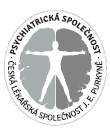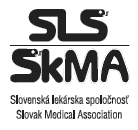Česká a slovenská psychiatrie

Časopis
Psychiatrické společnosti ČLS JEP
a Psychiatrickej spoločnosti SLS
původní práce / original article
OVLIVNĚNÍ KOGNITIVNÍHO DEFICITU U NEMOCNÝCH S DEPRESIVNÍ PORUCHOU POMOCÍ REPETITIVNÍ TRANSKRANIÁLNÍ MAGNETICKÉ STIMULACE (RTMS) V PODMÍNKÁCH JEDNODUŠE SLEPÉ, RANDOMIZOVANÉ STUDIE
INFLUENCING COGNITIVE DEFICIT IN PATIENTS WITH DEPRESSIVE DISORDER BY MEANS OF REPETITIVE TRANSCRANIAL MAGNETIC STIMULATION (RTMS) UNDER CONDITIONS OF SINGLE BLIND RANDOMIZED STUDY
Kučerová H., Přikryl R., Navrátilová P., Čéšková E., Ustohal L.
Psychiatrická klinika LP MU a PN, Brno,
přednostka prof. MUDr. P. Čéšková, CSc.
přednostka prof. MUDr. P. Čéšková, CSc.
SOUHRN
Vyšetřeno bylo 40 pacientů-mužů-hospitalizovaných na Psychiatrické klinice Lékařské fakulty Masarykovy univerzity a Fakultní nemocnice Brno (PK LP MU a PN, Brno). U 22 pacientů se jednalo o depresivní epizodu (P32), 18 zbývajících trpělo rekurentní depresivní poruchou (P33) dle Mezinárodní klasifikace nemocí, 10. revize (MKN-10), diagnostická kritéria pro výzkum. O zařazení do zkoumaného (N=20) nebo kontrolního (N=20) souboru rozhodl generátor náhodných čísel. Do zkoumaného souboru byli zařazeni jen ti nemocní, kteří podepsali informovaný souhlas a nebyla u nich kontraindikace k léčbě rTMS. Jednotlivé parametry kognitivních funkcí (paměť, pozornost, exekutivní funkce, slovní plynulost, vizuomotorika, premorbidní intelekt) byly zmapovány pomocí komplexní baterie neuropsychologických testů., psychopatologie byla hodnocena škálami HAMD a MADRS. Při léčbě pomocí rTMS došlo ke statisticky signifikantnímu zlepšení psychomotorického tempa (TMT A), odolnosti vůči percepční a psychické zátěži (CWT), slovní plynulosti (VPT) a mnestických schopností - všechny indexy (WMS-III). Exekutivní funkce se také statisticky signifikantně zlepšily, a to v kategorii perseverativní odezvy a perseverativní chyby. Po léčbě antidepresivy nastalo statisticky významné zlepšení v porovnání se stavem na počátku léčby ve Stroopově testu (CWT), v testu Slovní plynulosti (VPT) a ve všech indexech Wechslerovy paměťové škály (WMS III.). Při léčbě rTMS, na rozdíl od léčby antidepresivy, došlo ještě ke statisticky významnému zlepšení psychomotorického tempa a exekutivních funkcí, zejména dimenzí perseverativní odezvy a perseverativní chyby. Léčba antidepresivy tyto parametry kognitivních funkcí významně nezměnila. rTMS se tedy zdá v léčbě kognitivního deficitu u depresivní poruchy efektivnější než léčba antidepresivy. Míra změny psychopatologie pacientů léčených rTMS anebo antidepresivy ovšem nesouvisela s dynamikou neuropsychologického vyšetření před a po léčbě. Co se týká závažnosti psychopatologie, výsledky ukazují, že oba způsoby léčby, rTMS i antidepresivní medikace, jsou u léčby lehké až středně těžké depresivní poruchy stejně účinné.
Klíčová slova: rTMS, deprese, kognitivní deficit, psychopatologie.
SUMMARY
Kučerová H., Přikryl R., Navrátilová P., Čéšková E., Ustohal L.: Influencing Cognitive Deficit in Patients with Depressive Disorder by Means of Repetitive Transcranial Magnetic Stimulation (rTMS) Under Conditions of Single Blind Randomized Study
We assessed 40 patients - men hospitalized at Department of Psychiatry, Medical Faculty and Faculty Hospital Brno. 22 patients were assessed as depressive episode (F32), 18 patients as recurrent depression disorder (P33) according to ICD 10th revision (research criteria). Patients were distributed into to two groups - rTMS (N=20) and antidepressants (N=20) treatment by random number generator. Into research group there were included only these patients, who subscribed informed consent and no contraindication to rTMS treatment were present. Different parameters of cognitive functions (memory, attention, verbal fluency, executive functions, etc.) were measured by comprehensive neuropsychological test battery, and psychopathology was assessed by HAMD and MADRS scales. During rTMS stimulation treatment we have found statistically significant improvement in psychomotor speed (TMT A), tolerance against perceptional and mental stress (CWT), verbal fluency task (VPT), and memory - in all indexes of WMS III. We have also found improvement in executive functions - in category of perseverative responses and perseverative errors. After treatment with antidepressants we have found statistically significant improvement in Stroop test (CWT), in Verbal Fluency Task (VPT) and in all indexes of WMS III too. In contrast to antidepressants rTMS stimulation treatment has been furthermore associated with the improvement in psychomotor speed an executive functions (perseverative responses and perseverative errors). Treatment with antidepressants did not change these parameters. The degree of depression change has not been correlated with the value of cognitive deficit dynamics before and after treatment setting in patients cured as with rTMS as with antidepressants. Concerning severity of psychopathology, results show that both ways of treatment settings, rTMS and anti-depressants, are effective in the same way in the treatment of mild and modest depression. In conclusion we can say, that rTMS is more effective in the attenuation of cognitive deficit in patients suffered form depression than antidepressants treatment.
Key words: rTMS, depression, cognitive deficit, psychopathology.





